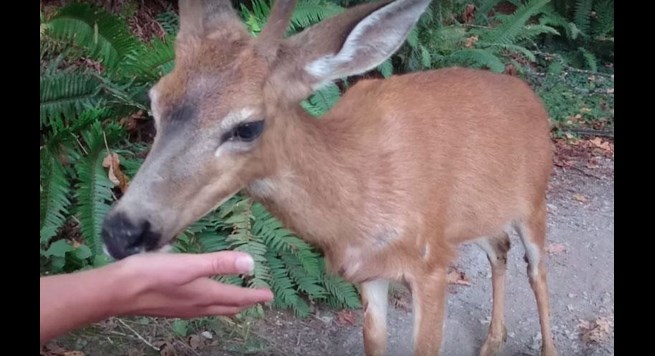
Image Credit: Twitter
September 15, 2015 - 9:39 AM
VANCOUVER - The little deer that wandered through downtown Vancouver, enchanting bystanders and causing traffic mayhem, has been hit by a car and killed.
Police say they were called to the Stanley Park Causeway on Sunday night after receiving a call about a deer being fatally struck.
Sgt. Randy Fincham said the animal was removed from the road before officers arrived.
A statement issued Monday by B.C.'s Ministry of Forests, Lands and Natural Resource Operations said the dead deer was "very likely" the same animal that captured the hearts of Vancouverites and tourists alike this summer.
The young buck became a social media star with its own Twitter account — with the username @DowntownDeer — after being spotted wandering the streets of Vancouver in July. Fawning fans spent the summer posting photos and videos of the animal.
Officials say urban deer are extremely rare in Vancouver, and only two have been spotted in Stanley Park since the 1960s.
The black-tailed deer originally swam the Burrard Inlet from Vancouver's North Shore and spent most of the summer living off grass, shrubs, roses and other vegetation in Stanley Park, said Nick Page, a biologist with the Vancouver Park Board.
Videos of the curious creature licking people's hands and taking food have surfaced and the behaviour shows the deer was likely cared for by humans at some point, Page said.
"The deer didn't develop those kind of behaviours of tolerance to people on its own," he said. "It's had some care or influence of being with people in the past."
Provincial officials had been looking into options for relocating the deer, but a statement from the Ministry of Forests said no solution had been found before the animal was killed.
"Because the deer was clearly habituated to humans, simply relocating it to the wild would not have been successful. The deer would have either become a problem somewhere else or died due to being unable to fend for itself," the statement said.
The Vancouver Park Board said that while there are positive aspects to seeing wildlife in the city, it's reminding people that getting too close to such animals can hinder their well-being.
"I think generally, wildlife should remain wild and we shouldn't be trying to turn them into pets by feeding them or ... taking selfies with them," Page said.
Patricia Thomson, executive director of the Stanley Park Ecological Society, said the deer's death was not surprising considering the attention it had received in recent months.
"People don't understand, often, that their good intentions can put that animal in jeopardy," she said.
Thomson understands the "call of the wild" drawing people to be close to animals, but said wild animals should be allowed to stay wild.
"It's amazing when you get a chance to see such a beautiful animal close up," she said. "Unfortunately, people's desire to have that connection with urban wildlife often leads to its demise, either directly or indirectly."
News from © The Canadian Press, 2015